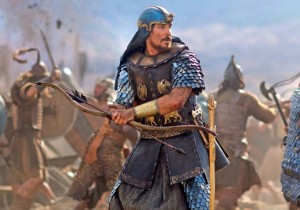If you are an international news watcher, you may have heard President Obama quote Exodus 23:9 in his executive action to bring changes to the US immigration system. The President said: “Scripture tells us that we shall not oppress a stranger, for we know the heart of a stranger – we were strangers once, too.”
Whatever one feels about the appropriateness of using a passage of Israel’s law to introduce 21st century legislation (and plenty of commentators have weighed in on that), it is startling that the ancient book of Exodus should be invoked by the most powerful Western politician in a moment of decisive leadership.
Exodus punches above its weight. At first glance, it is the story of the enslaved Israelites, the rise of Moses as their leader, and their dramatic escape from Egypt. It is also the book recording the “contract” between God and his escapees, summarised in the Ten Commandments. Exodus also “entertains” the reader with the wilderness wanderings of the Israelites on their way to the Promised Land of Canaan.
All of these elements of the exodus story have had a huge impact, beyond its immediate context, on diverse cultures ever since. The Ten Commandments still shape a great deal of ethical discussion and often adorn the wall in American courtrooms. “Wandering in the wilderness” is a theme for any lost, misdirected, and poorly led organisation. “Reaching the Promised Land” is still the way we describe our goals.
Perhaps most famously, Martin Luther King cited parts of Exodus (and Deuteronomy) in his “Mountaintop” speech, employing the exodus narrative to give shape to the civil rights movement: “I just want to do God’s will. And he’s allowed me to go up to the mountain. And I’ve looked over and I’ve seen the Promised Land. I may not get there with you. But I want you to know tonight, that we, as a people, will get to the Promised Land.”
 And in this next month, Ridley Scott, the celebrated film director of Alien and Blade Runner, will release a new movie based on the exodus story. Australians will spend the Christmas season with Christian Bale as Moses on the big screen.
And in this next month, Ridley Scott, the celebrated film director of Alien and Blade Runner, will release a new movie based on the exodus story. Australians will spend the Christmas season with Christian Bale as Moses on the big screen.
For those who feel the Bible has lost its relevance and appeal, Hollywood and the American president beg to disagree. An account of the rescue of one nation has become a cornerstone for many others. It has been found to speak loudly to issues of race relations, politics and power, and hope beyond oppression.
Even more so, at Christmas time, the exodus story provides one of the important frameworks for understanding Jesus, the true fulfilment of the “escape from slavery” theme. As the Gospel of Matthew tells us, “Out of Egypt I have called my son.”
Greg Clarke is CEO of Bible Society Australia and author of the 2014 Australian Christian Book of the Year, The Great Bible Swindle.
Email This Story
Why not send this to a friend?




